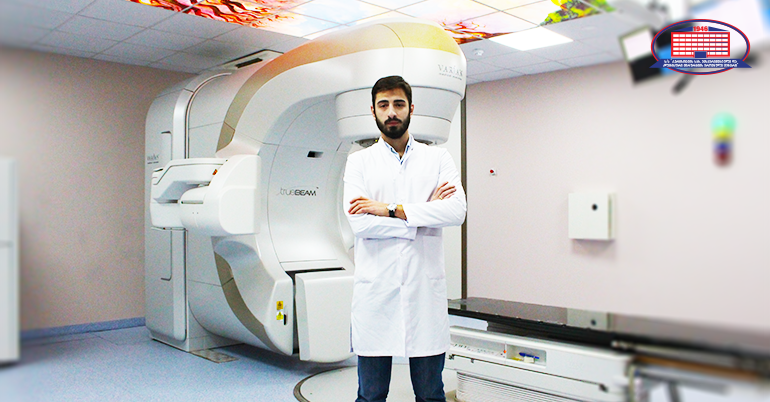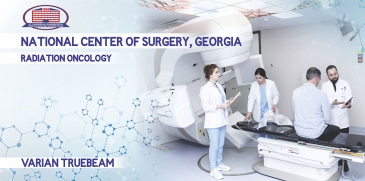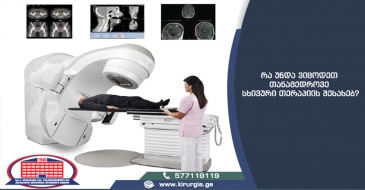
Radiotherapy Department of National Center of Surgery offers cancer patients radiation therapy using the latest generation high technology linear accelerators.
Department is equipped with U.S. company Varian’s modern and sophisticated 2018 linear accelerators – Truebeam. Planning and treatment for every patient are delivered in high quality and in accordance with safety norms!
Team of specialists including invited experts from the U.S and Spain (Emory University, Atlanta, U.S.; Spain Genesis Care’s Multidisciplinary Institution of Oncology) review each case and plan individual treatment tactics. Specialists of various fields participate in treatment review and planning.
This project of National Center of Surgery enables citizens of Georgia to receive American-European standard treatment with the help of Georgian and foreign doctors and professional team. It’s a treatment because of which the majority of Georgians decide to go abroad.
It’s worth mentioning that radiotherapy is one of the main methods of treatment in modern oncology that is necessary for 70% of people affected by cancer.
Radiation therapy locally affects cancer to kill cancer cells. It can be radical (curative), neoadjuvant (preoperative), adjuvant (postoperative) or palliative (to decrease pain, stop bleeding).
Radiotherapy team cooperates closely to ensure safe and high-quality treatment for a patient.
Team comprises:
- Radiation oncologist orders and manages radiotherapy;
- Medical physicist ensures the quality of the procedure. A specialist is responsible for the calibration and accuracy of radiation therapy equipment;
- Radiology technician administers patient's daily procedures for the plan to proceed accurately and with appropriate dose;
- Radiation oncology nurse interacts with the patients and their guardians on a daily basis. Within the competence, collects information regarding the patient receiving the treatment (nutrition, daily routine, hygiene, following the doctor’s recommendations and so on.)
Radiation oncologist, brachytherapist of National Center of Surgery, Lasha Goginashvili discusses the radiotherapy.
– Mr. Lasha, When is the radiotherapy administered?
– As you know, radiotherapy is the method of treatment, during which ionizing radiation kills cancer cells.
Radiotherapy is most often administered to treat cancer of various sites as radical or palliative treatment.
Radiotherapy delivery depends on numerous factors and it’s necessary to discuss it individually based on specific cases, albeit, generally we can say that it’s administered if it satisfies the following postulate: Aggressiveness of the treatment doesn’t exceed aggressiveness of the disease.
–What can you tell us about the linear accelerators of National Center of Surgery, using which the radiotherapy is administered?
–Linear accelerators of National Center of Surgery present two latest, clinical equivalent, twin accelerators manufactured by one of the most well-known companies “Varian”. These accelerators enable treatment to be conducted per international standards and the latest technologies. Moreover, identical configuration ensures uninterrupted irradiation without alteration to planes or prolonged process.
– What advantages does the radiotherapy have compared to other methods of cancer treatment?
–Unlike chemotherapy, it’s characterized by local effect, because of which there are no systemic side effects.
Unlike surgery, external radiation therapy is non-invasive, doesn't require anesthesia (except particular exceptions) and what's most important, the target organ is intact.
–What are the preparation procedures before radiotherapy?
– To begin radiotherapy several necessary and subsequent steps need to be taken, in particular: CT (computed tomography) simulation, contouring, treatment planning, and dosimetry.
CT (computed tomography) simulation features a patient's positioning on the computed tomography scanner with different mobilizing equipment.
In contouring, the doctor defines target mass, i.e. organs to irradiate and to protect and makes an outline on each slice of the computed tomography scanner.
Planning is an equivalent distribution of doses on the targeted masses by a doctor on the basis of the maximal protection of healthy organs.
Dosimetry is the assessment of pragmatically planned treatment and how it’s physically possible to conduct it on the device.
– How is the radiotherapy conducted?
– With mobilizing equipment, patient is in a position determined by CT simulation during irradiation. The device rotates around the body and irradiates the targeted mass without any contact.
– What is the treatment after radiotherapy?
– To treat side effects occurring during and after radiation therapy, patients need to follow concrete recommendations: apply a burn cream, take analgesic and antiseptic medications, follow a particular diet and so on.
In National Center of Surgery, numerous patients have received high-quality medical care with qualified medical personnel and ultramodern technologies since the establishment of the Radiation Therapy Department.
One of the examples is the case of 79 years old patient who had a small mass in the head for several years. The patient underwent an operation at the other clinic in 2018 – removal of the mass in the forehead. The morphological study detected T cell-rich B cell lymphoma (treatment of this cancer isn’t operative, it’s managed by chemo and radiation therapy). In 2 months after the operation, large ulceration developed at the site of the surgery that spread throughout the whole forehead and both eye sockets (caused pressure on optic nerves, sharp protrusion of eyeballs, and visual disorder: blind in one eye, double vision in the other eye), metastasized to the right parotid gland and inflammation with infiltration spread to the right maxillary sinus.
Upon admission to our clinic, the patient had unbearable pain in the areas damaged by cancer, general weakness, was practically blind in the right eye, whereas had double vision in the left eye. The patient also had an enlarged and painful right parotid gland.
Damaged areas were irradiated in the Radiation Therapy Department of National Center of Surgery in July and August of 2018. During the treatment the unbearable pain was alleviated, aforesaid cancerous ulceration was reduced in half. The vision was restored and eyeballs returned to the standard anatomic position at the end of the treatment. Infiltration and ulceration in the forehead, eye socket, maxillary sinus were cleared up;
Moreover, a metastatic lesion in the right parotid gland disappeared. The patient was referred to oncohematologist for further treatment.
National Center of Surgery address: Tbilisi, Dighomi, Chachava N5.
You may contact National Center of Surgery via call-center at 577 119 119 or 2 02 25 25.
For a consultation on any issue, you may contact radiation oncologist, brachytherapist of National Center of Surgery Lasha Goginashvili at 599 62 17 15.
Wish you health!











